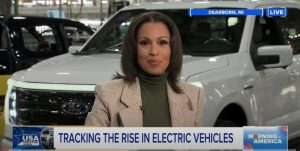An article in The Texas Tribune has many of my fellow  EVers up in arms over taxes. It seems a Republican state representative mentioned that increasing the registration fee on electric cars “like the Nissan Leaf” is being considered as a way to fund road construction. Currently, most of the funding of new road construction comes from the 38.4 cents of state and federal tax on a gallon of gas. Let’s think about that for a moment. The tax is per gallon of gas. We’ll come back to that…
EVers up in arms over taxes. It seems a Republican state representative mentioned that increasing the registration fee on electric cars “like the Nissan Leaf” is being considered as a way to fund road construction. Currently, most of the funding of new road construction comes from the 38.4 cents of state and federal tax on a gallon of gas. Let’s think about that for a moment. The tax is per gallon of gas. We’ll come back to that…
In December 2007, President George W. Bush, signed the Energy Independence and Security Act, which set a goal for the national fuel economy standard of 35 miles per gallon by the year 2020. This is an increase of 40% and was supported by all but four of the Democrats in the House of Representatives. I think EV owners would all agree that this is a good thing, as we’ve voted with our pocketbooks by being early adopters of super-efficient vehicles. This increase to the Corporate Average Fuel Economy (CAFE) regulations is the first change in the fuel economy standard since the standard was first introduced in 1975!
In 2009, President Obama had the Department of Transportation review the CAFE standard for the 2011 model year and, believe it or not, reduced the efficiency requirement, mandated under the Bush administration, by one mile per gallon, but accelerated the improved efficiency to 35.5 MPG by 2016, instead of 35 MPG by 2020.
 Now, back to the idea of using a tax on a gallon of gas, to fund repairing and building of roads. What happens to the revenue, when the vehicles become 40% more efficient and much less gasoline is purchased? The tax revenue will plummet. In Texas, funds for construction are already said to be under great strain. I’m not sure about where you live, but in and around the Dallas/Fort Worth area, it seems like every highway is undergoing heavy modification. Construction crews are everywhere. We need them to be! Not only am I glad to see congested areas being modified to handle more traffic, but I’m glad to see we are employing lots of people in the construction industry during a time of economic hardship. We need those jobs to help end the recession! There’s no wondering why construction budgets are feeling tight.
Now, back to the idea of using a tax on a gallon of gas, to fund repairing and building of roads. What happens to the revenue, when the vehicles become 40% more efficient and much less gasoline is purchased? The tax revenue will plummet. In Texas, funds for construction are already said to be under great strain. I’m not sure about where you live, but in and around the Dallas/Fort Worth area, it seems like every highway is undergoing heavy modification. Construction crews are everywhere. We need them to be! Not only am I glad to see congested areas being modified to handle more traffic, but I’m glad to see we are employing lots of people in the construction industry during a time of economic hardship. We need those jobs to help end the recession! There’s no wondering why construction budgets are feeling tight.
It has been shown over the years that the American public and the American auto industry will not move toward more efficient transportation on their own. Just look around you on the road. How many large SUVs do you see that have only one passenger? We, as a people, get concerned over fuel efficiency, only when the price of gas spikes or there is a threat of foreign conflict centered around oil.
I lived through the gasoline embargoes of the 1970’s and vividly remember the lines at gas stations, the hours-long waits to get gas, the even and odd day rationing of gasoline and the green and red flags displayed at stations to show if they had fuel available or not.
It was not a pretty picture.
What did we do, just a few years later? We went back to buying big, inefficient American cars and American auto manufacturers were more than happy to sell them to us. Obviously, we need a carrot-and-stick method of moving the public toward energy efficiency. The carrot is composed of paying less to drive your vehicle, tax incentives to purchase electric vehicles, the granting of HOV lane access privileges (in some states, are you listening Texas?) and for some, knowing that we are making an effort to slow or stop global climate change.
The stick was mainly paying more for fueling our inefficient vehicles.
Due to the mandated increases in fuel efficiency, we must come up with a better way to fund construction and infrastructure repairs. Here’s an opportunity to create another stick. How about having the amount of the registration fee be based on a combination of two factors, fuel efficiency and gross vehicle weight? Heavier vehicles cause more wear and tear on our roads and should contribute more to their maintenance. We want our national fleet to be comprised of more efficient vehicles, which generally are lighter in weight (although batteries are heavy), so a component of the fee could also be based on the MPGe of the vehicle. Finally, those who drive farther cause more wear and tear on the roads. We could have revenue be based on the number of miles the car has travelled, by making this part of the annual vehicle inspection fee, when the odometer could be read with the data then entered by VIN number. When ownership of the vehicle changes, the odometer reading is collected, so the final mileage revenue (for the owner of the vehicle) would be via the title transfer fee.
 We all want safe roads and bridges. Remember the bridge collapse in Minnesota? Are we naive enough to think that was the only bridge at risk in the nation? When I was a young boy, I remember the family driving to Louisiana for a funeral. Immediately after we crossed the state line, the roads were in obviously worse shape. Potholes were everywhere. Even a child could recognize the difference. None of us want that, and drivers of electric vehicles that I have met are more than willing to pay their fair share to maintain the roads we all use. They are all about civic duty.
We all want safe roads and bridges. Remember the bridge collapse in Minnesota? Are we naive enough to think that was the only bridge at risk in the nation? When I was a young boy, I remember the family driving to Louisiana for a funeral. Immediately after we crossed the state line, the roads were in obviously worse shape. Potholes were everywhere. Even a child could recognize the difference. None of us want that, and drivers of electric vehicles that I have met are more than willing to pay their fair share to maintain the roads we all use. They are all about civic duty.
But there’s a problem with increasing registration fees for EVs. There are obvious reasons this is a bad idea:
- The revenue problem is not solved in an responsible way. We are just making a ragged patchwork of taxes to quickly solve a complex issue that isn’t going away. We need legislators to grow up and do their jobs. This is a tough issue and applying a band aid to fix a perceived unfairness does nothing to resolve the revenue shortfalls that will be coming. We need ideas that are easily understood and equitable.
- We would be singling out a group for taxation that is doing what the nation needs done: buying fuel efficient, low pollution vehicles! While true, that without changing the fee, the drivers of EVs aren’t paying their fair share, singling them out is too visible to those considering a change to electric transportation and may dissuade them from making the switch (pun intended).
- It doesn’t make” numbers sense.” It has been estimated that there are only 2,000 EVs in Texas. A $100 fee would generate an additional $200,000 dollars per year. That’s a drop in the bucket! The next time you drive by a road project that has a sign showing how much the project cost (I have seen these many times in Texas), take a look at that number. Even one small project would easily use more than the entire amount generated by this fee change. On top of that, my previous car would have generated $261.82 in gasoline sales taxes but my Volt will only generate $38.92.
- Once a tax is enacted, it never goes away. If I’m right about #3 above, EV owners will pay the higher registration fee on top of whatever other taxes will be enacted to resolve the revenue shortfall caused by increasingly more efficient vehicles.
- Finally, I know they’re in the majority here in Texas, but it seems odd to me that every congressman mentioned in the various articles pushing for this are Republican. Republicans, PLEASE stop your war on efficient, non-polluting electric vehicles!



Buzz, in this post you wrote…
“In December 2007, President George W. Bush, signed the Energy Independence and Security Act, which set a goal for the national fuel economy standard of 35 miles per gallon by the year 2020. This is an increase of 40% …
In 2009, President Obama had the Department of Transportation review the CAFE standard for the 2011model year and, believe it or not, reduced the efficiency requirement, mandated under the Bush administration, by one mile per gallon, but accelerated the improved efficiency to 35.5 MPG by 2016, instead of 35 MPG by 2020.”
I’m confused by what you say is a “reduced” efficiency requirement by President Obama. Please explain that to us.
Thanks, Larry in Austin
Larry,
What was reduced was the standard for the year 2011. The ultimate goal for 2020 was moved up to 2016 and that final goal was increased by 1/2MPG, from 35 MPG to 35.5 MPG.
Thanks for keeping me honest, I apologize for not being more clear.
-Buzz